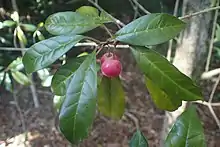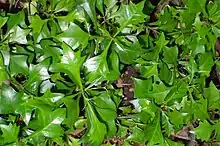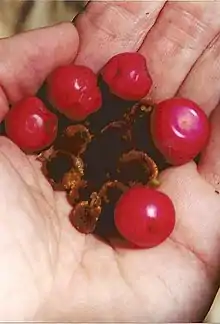Vitex lignum-vitae
Vitex lignum-vitae, known in Australia as yellow hollywood or "lignum-vitae" (also used for other species), is a rainforest tree of eastern Australia.[1] The natural range of distribution is in dry, sub-tropical or tropical rainforest from the Richmond River, New South Wales to Cape York Peninsula at the northernmost tip of Australia. It also occurs in New Guinea.[2] Lignum vitae is Latin for "wood of life".[3]
| Vitex lignum-vitae | |
|---|---|
 | |
| Vitex lignum-vitae in Coffs Harbour Botanic Garden | |
| Scientific classification | |
| Kingdom: | Plantae |
| Clade: | Tracheophytes |
| Clade: | Angiosperms |
| Clade: | Eudicots |
| Clade: | Asterids |
| Order: | Lamiales |
| Family: | Lamiaceae |
| Genus: | Vitex |
| Species: | V. lignum-vitae |
| Binomial name | |
| Vitex lignum-vitae (A.Cunn. ex Schauer) Piep. | |
| Synonyms | |
| |


Description
A small to medium tree growing to 30 metres tall[1] and a trunk diameter of 90 cm. The trunk is creamy or brown, with horizontal lines and fissures. Bark sheds in small flakes. Flanged or buttressed at the base of larger trees, the bole is irregular in shape.[2]
Juvenile and coppice leaves lobed or angled. Mature leaves opposite, simple, shiny and not toothed. 5 to 13 cm long, often broader towards the tip. Leaf stalks 15 to 25 mm long, hairy and channelled on the upper side. Net veins visible on the leaf's underside. Small foveolae (raised hairy bumps) appearing at the junction of the midrib and larger lateral veins. Branchlets grey and hairy, somewhat four angled in cross section.[2]
Pale purple flowers form on cymes at various times of the year.[1] Most often around the month of April. The fruit is red drupe, 8 to 12 mm in diameter with a round hard capsule inside. The capsule has four cells, each containing a fertile or infertile seed. Fruit ripens in the months of November to April. Fruit eaten by birds including the green catbird and rose crowned fruit dove.[2]
Regeneration from seed is remarkably slow and difficult. The fleshy aril should be removed from the fruit capsule. Old fruit is preferred. Roots and shoots may appear after two or more years.[4]
References
- B. J. Conn. "Vitex lignum-vitae, PlantNET - NSW Flora Online". Retrieved 2021-05-19.
- Floyd, A. G. (1989). Rainforest Trees of Mainland South-eastern Australia (1st ed.). Port Melbourne: Elsevier Australia - Inkata Imprint, copyright Forestry Commission of New South Wales (published 1989-12-01). p. 409. ISBN 0-909605-57-2. Retrieved 2009-07-15.
- "Lignum Vitae, The Wood Database". Retrieved 2021-05-19.
- "Vitex lignum-vitae, Brisbane Rainforest Action and Information Network". Retrieved 2021-06-02.
- Floyd, A. G. (1989). Rainforest Trees of Mainland South-eastern Australia (1st ed.). Port Melbourne: Elsevier Australia - Inkata Imprint, copyright Forestry Commission of New South Wales (published 1989-12-01). p. 409. ISBN 0-909605-57-2. Retrieved 2009-06-25. (other publication details, included in citation)